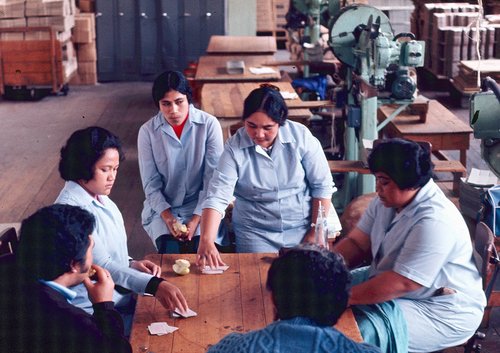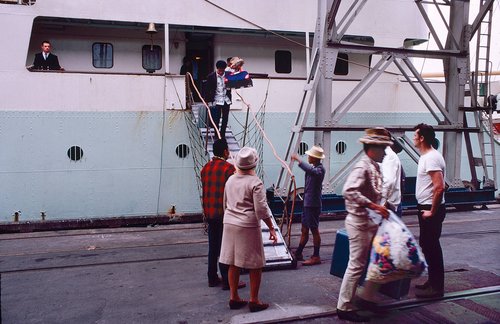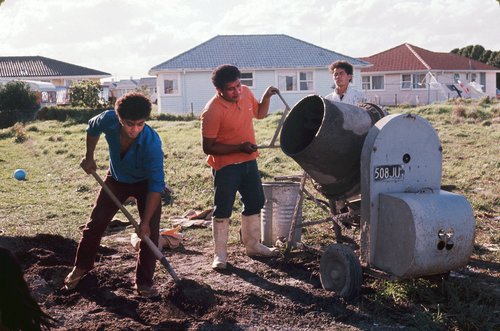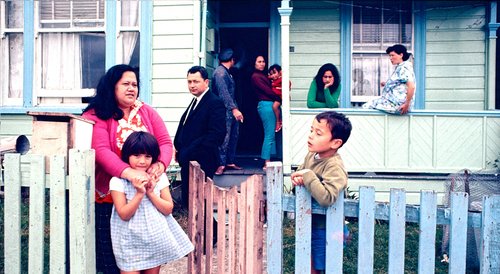
Hero image: Migrant workers playing cards, 1973 by Basil Williams. Auckland Libraries Heritage Collections 1727-087
50 years ago this week, police carried out the first in a series of Dawn Raids on Pacific ‘overstayers’ in Auckland. The importance of the Dawn Raids is reflected in how often they appear in our audiovisual archive; news programmes, radio shows, films and music videos all explore the topic. Some of these recordings were made as the raids were happening, while others were made by people reflecting on them years or decades later. In addition to the items that have been digitised and made available on our website, we also hold many items that are not yet available online, including analogue recordings.
Some context is required to understand how the Dawn Raids came about, and why they remain a source of hurt for New Zealanders of Pacific descent. Throughout the Sixties and early Seventies, Samoans, Tongans, Fijians and Cook Islanders often arrived on temporary or holiday visas, to work in factories and at other industrial jobs. Pay for these roles was typically low and the visas were as short as three months, not enough to save a worthwhile amount. Unofficially, authorities were often happy to turn a blind eye to immigration status, especially during labour shortages. Employers benefited from ignoring expired visas and keeping people on if they wanted to stay longer, rather than recruiting and training new staff all the time. This 1976 recording discusses the economic pressures that brought people to New Zealand, and the longstanding “selective administration” of immigration rules.

Auckland Libraries Heritage Collections 1727-084
Pacific Islanders arriving in Auckland, 1970 by Basil Williams.
In early 1974, New Zealand was in a difficult place economically. Unemployment and inflation were both high, and foreign oil was expensive. It was also a period of great social change, which had a lot of people feeling insecure. For some news outlets and politicians, people who didn’t have valid visas were an easy scapegoat for all sorts of problems like unemployment, crime, and housing shortages. In March 1974, police in Auckland began raiding the homes of suspected overstayers in the dead of night. They were also given the right to stop people in public and ask to see their documents. Workplaces, schools and church services were interrupted by immigration raids.
Dawn raids were deliberately scary and humiliating. A group of officers, sometimes accompanied by barking dogs, would force entry to a house when everyone was asleep. Once inside they pulled people out of bed, searched their belongings and demanded to see valid immigration documents. Many households that were targeted contained children, who were traumatised by police breaking in while they slept and taking their parents away. In this short film from 1999, director Justine Simei-Barton and writer Ene Petaia look back at the fear and mistrust affecting families in the Seventies.
Two 1976 editions of the radio show Te Puna Wai Kōrero, hosted by Selwyn Muru, discuss the Dawn Raids and their disproportionate effect on Pacific people. In the first, Muru and correspondents discuss the government’s unwillingness to allow an amnesty, where existing overstayers could legalise their status. He describes affected workers as "pawns of the industrialists" who have been used for their labour while needed.
In the second, Immigration Minister Frank Gill gives a combative and confusing interview in which he appears to claim that there are no Dawn Raids. Gill also refuses to substantiate his claim that there are “10,000 to 12,000” Polynesian overstayers in New Zealand.

Auckland Libraries Heritage Collections 1727-140
Workers mixing cement, 1973 by Basil Williams.
Defenders of the Dawn Raids described them as a fair response to lawbreaking, since the people arrested were accused of immigration violations. But one of the things that made the Dawn Raids so egregious is that they were targeted at one race. Community leaders and activists were quick to point out that overstayers from Britain, Europe, America, Australia and even Rhodesia were still being tolerated. From March 1974, immigration policy was being harshly enforced for Polynesians only.
Ngā Tamatoa, the Auckland Committee on Racism & Discrimination (ACORD), Citizen's Association for Racial Equality (CARE), the Polynesian Panther Party (PPP) and the People's Union formed a coalition in response to the Dawn Raids. In this 1975 recording representatives from the coalition criticise police behaviour toward urban Polynesians and Māori.
The New Zealand Government formally apologised for the Dawn Raids on August 1, 2021 with the hope that there would be much-needed closure and healing for Pacific communities.

Auckland Libraries Heritage Collections 1727-090
Ponsonby house, 1973 by Basil Williams.